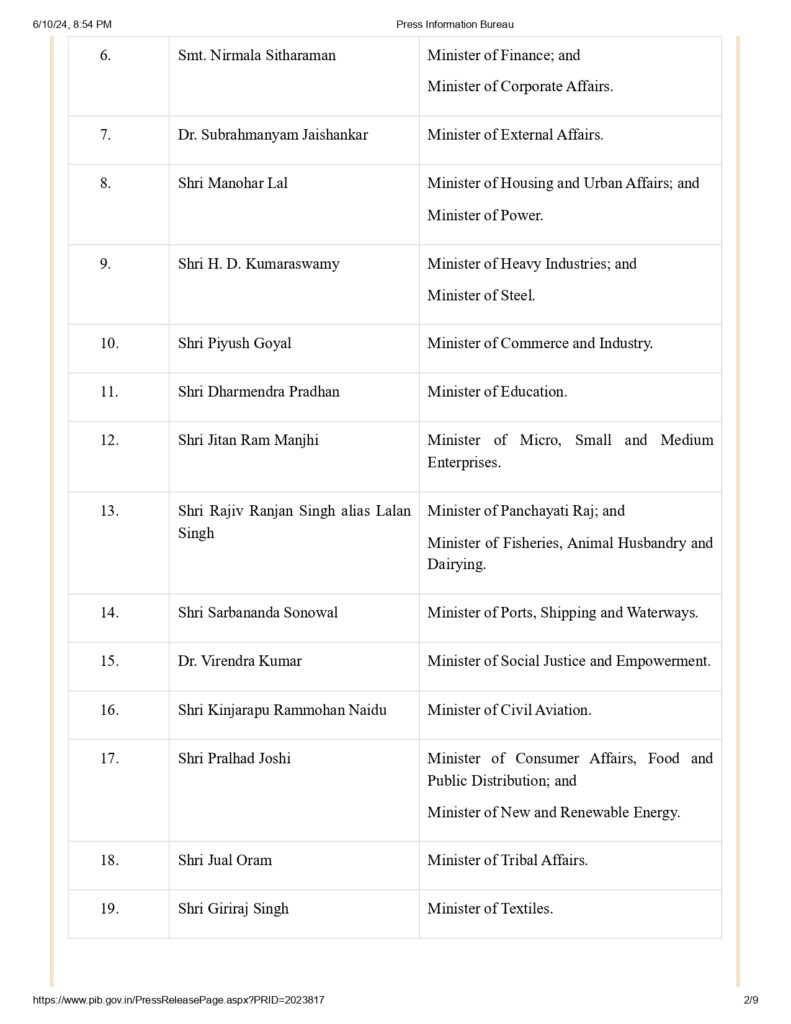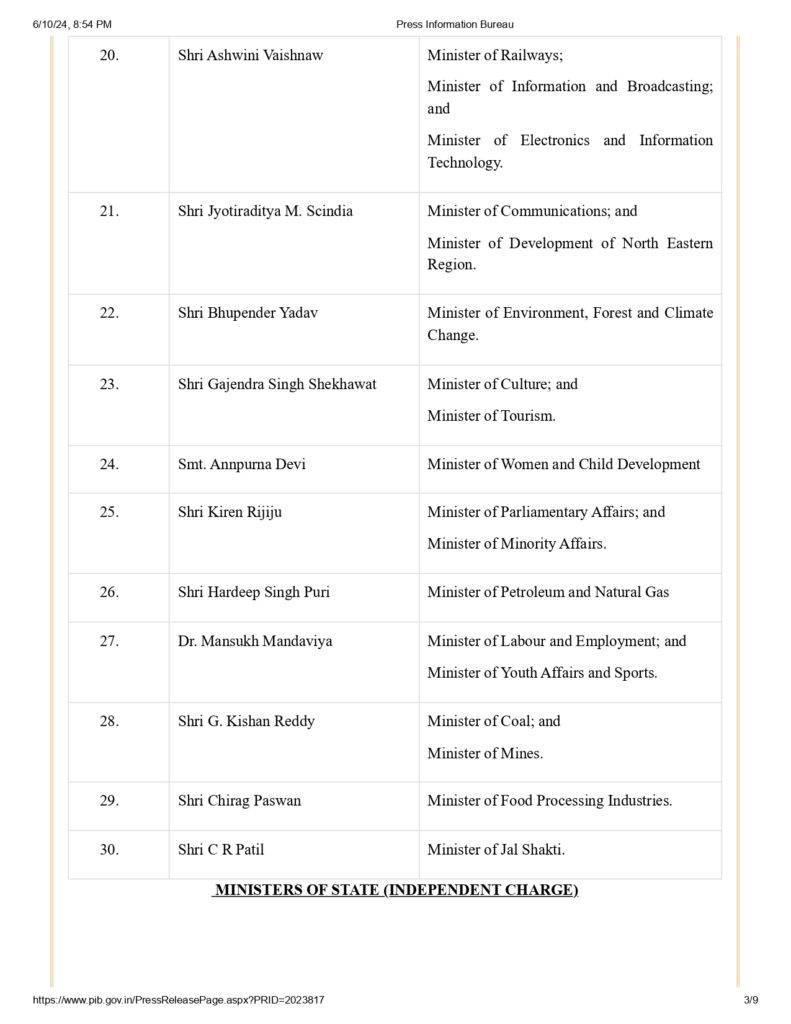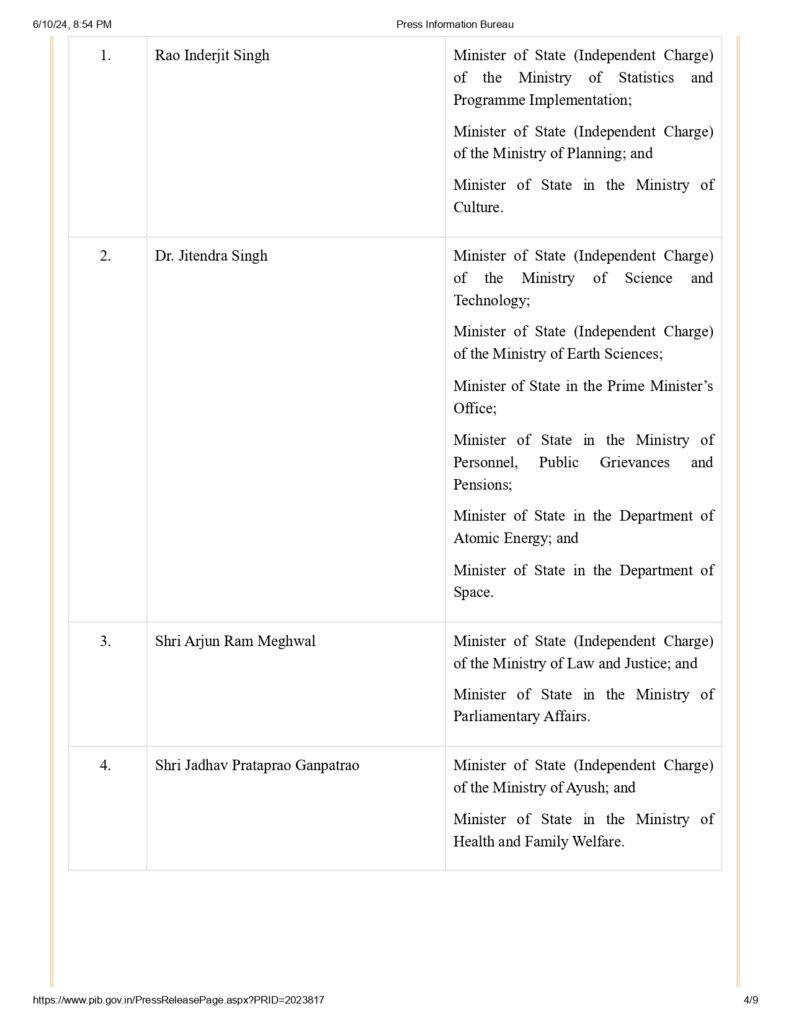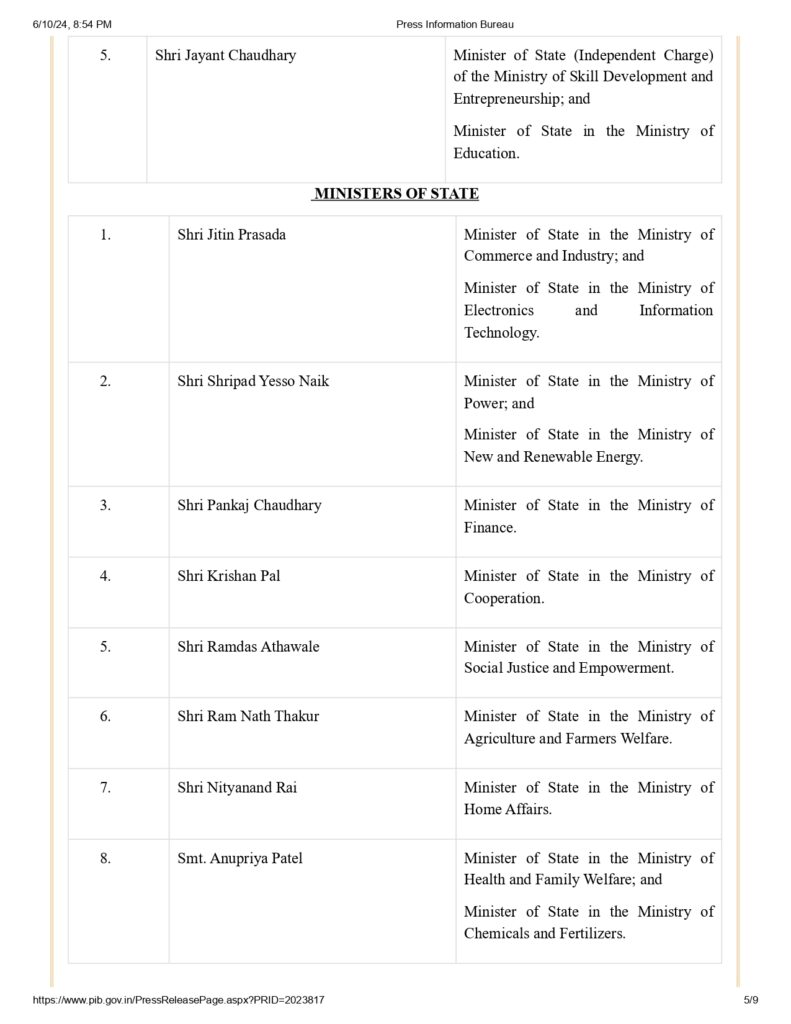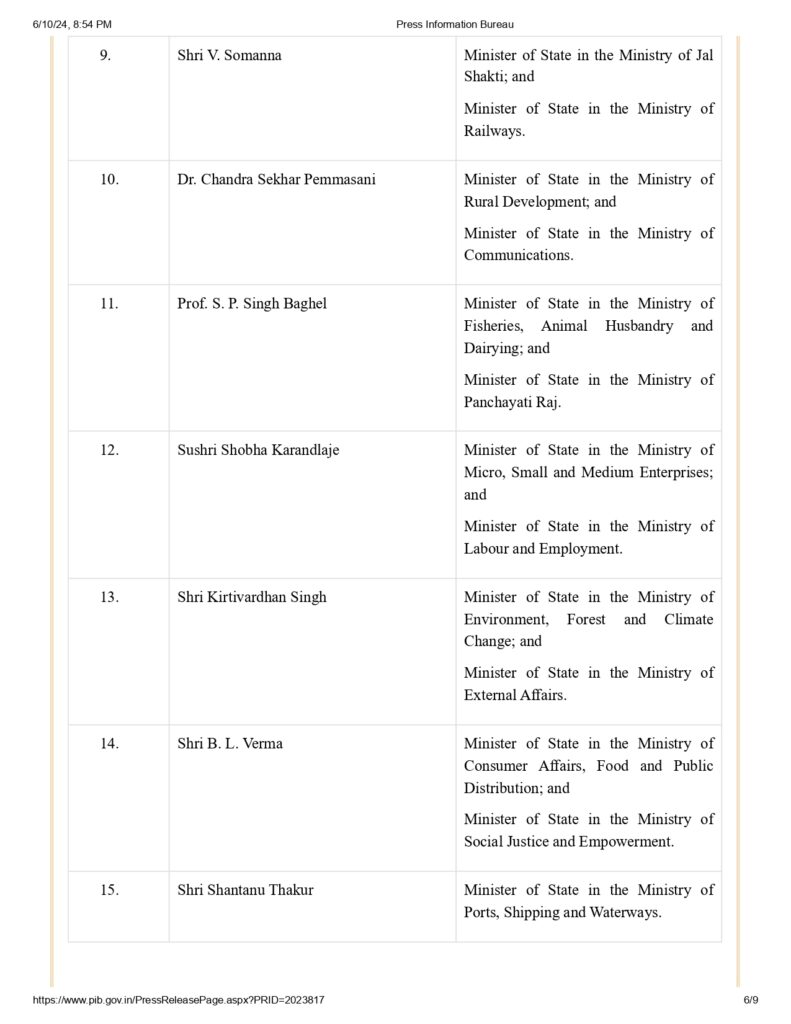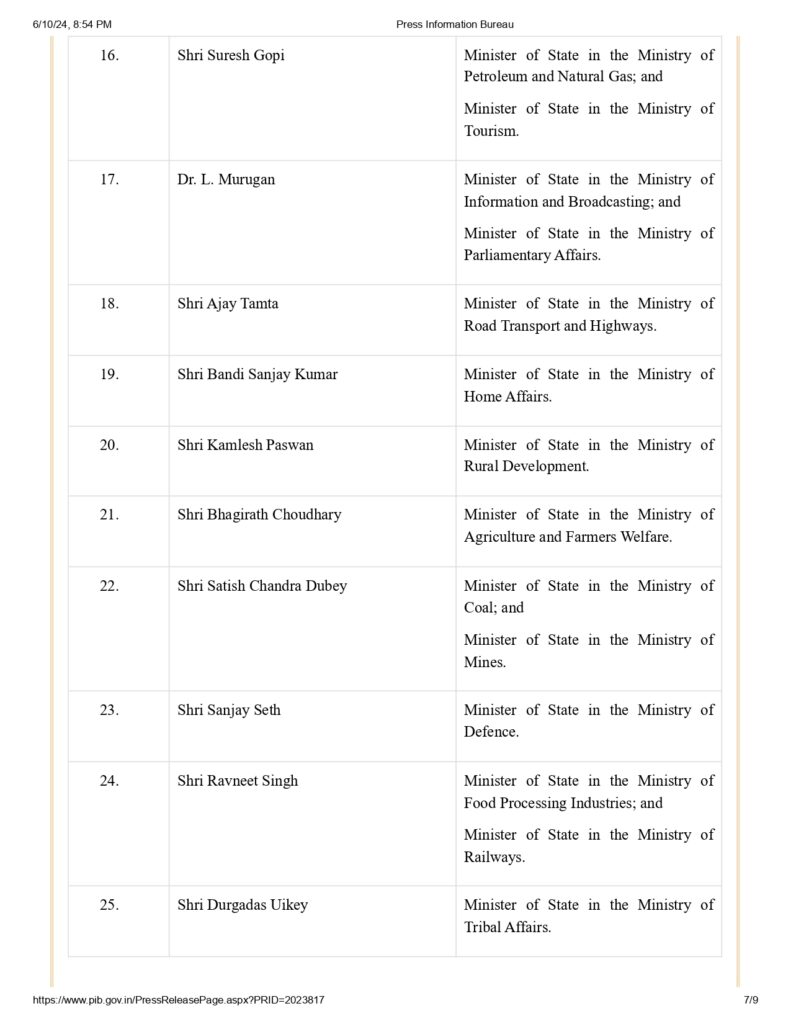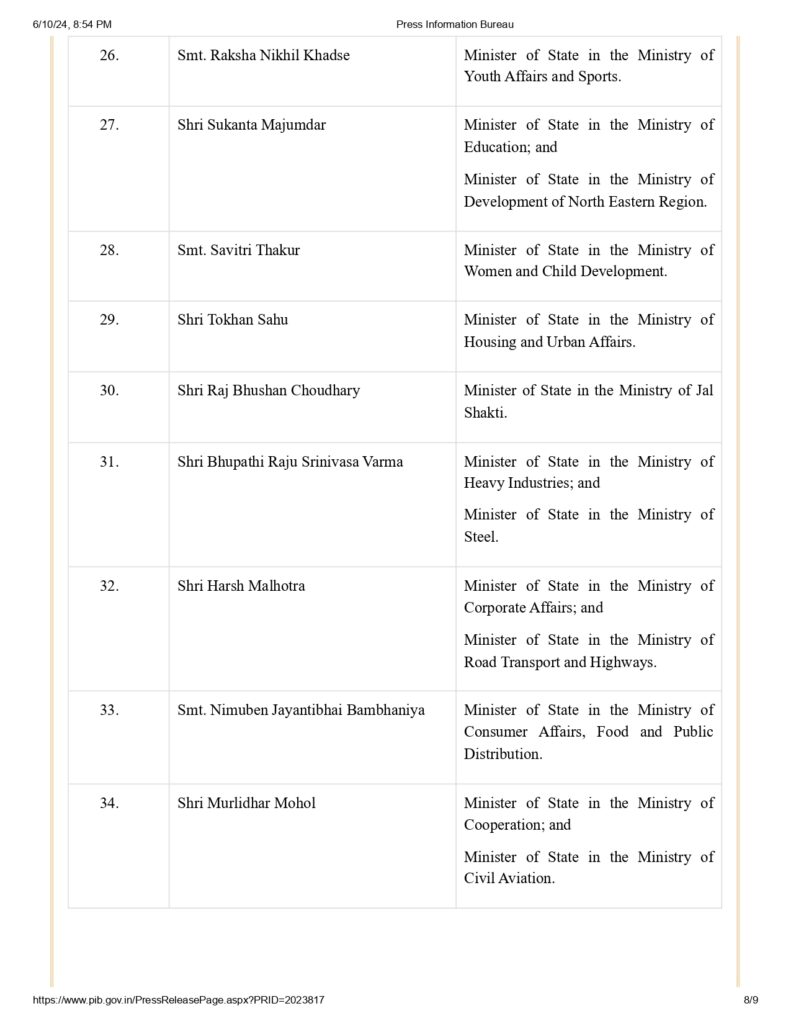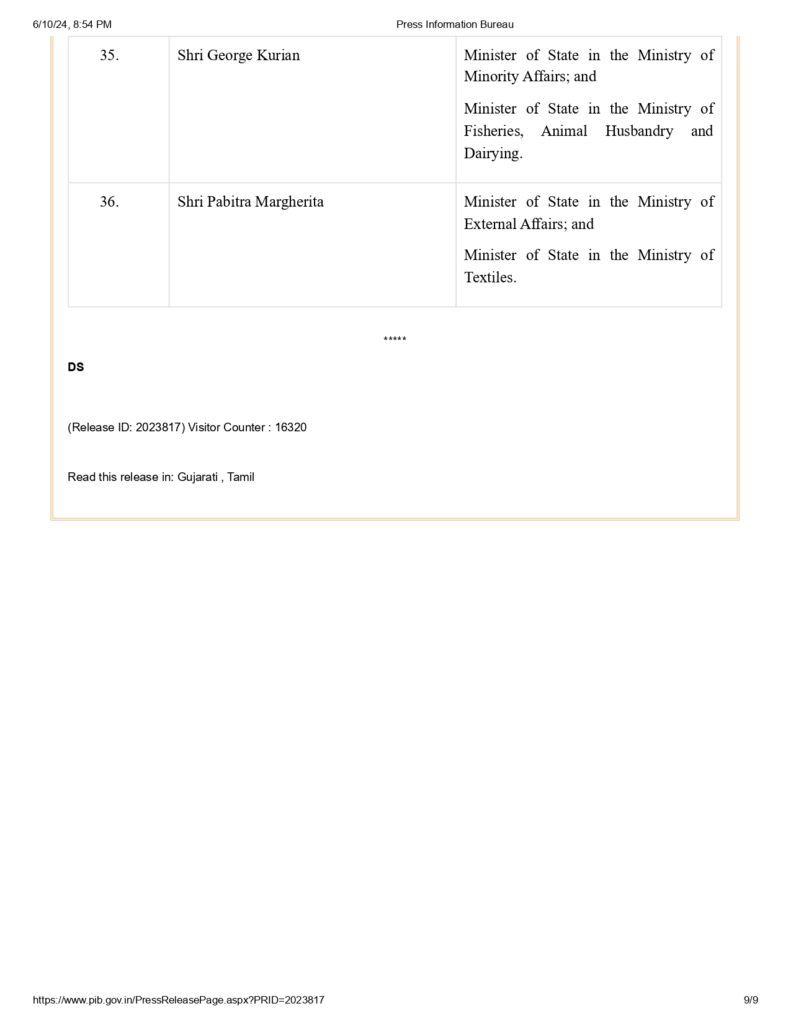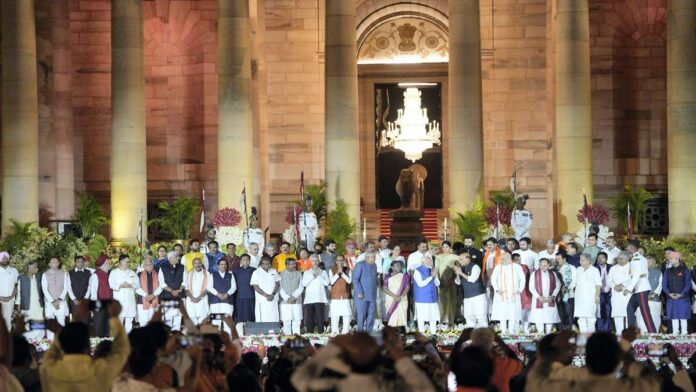PM chairs first Cabinet meet, portfolios allocated to ministers
Top 4 remain same with Amit Shah as home minister, Rajnath Singh as defence minister
Shivraj Singh Chouhan gets agriculture ministry, JP Nadda gets Health
New Delhi, EW Correspondent: A day after Narendra Modi and 71 ministers of the new coalition government took the oath of office, the first cabinet meeting of NDA 3.0 took place. This cabinet formation is marked by a strategic blend of continuity and an accommodation of key BJP figures as well as allies, reflecting a balanced approach to governance. Here’s an in-depth look at the portfolio allocations and the broader implications for India’s governance under Modi’s third term.
Amit Shah – Ministry of Home Affairs and Ministry of Co-operation:** Amit Shah retains his critical position, continuing his role in overseeing internal security, law and order, and the newly added Ministry of Co-operation, ensuring robust governance in internal affairs. Shah’s retention is a testament to his influence and effectiveness in managing the nation’s internal security apparatus, dealing with complex issues ranging from terrorism to communal harmony.
Rajnath Singh – Ministry of Defence:** Rajnath Singh’s continuation in the Defence Ministry ensures stability in defense policies and ongoing military modernization efforts. His steady leadership has been crucial in navigating India’s defense strategies, fostering international defense partnerships, and overseeing significant defense procurement to modernize the armed forces.
Nirmala Sitharaman – Ministry of Finance and Ministry of Corporate Affairs:** Sitharaman remains at the helm of India’s economic and corporate policies, vital for maintaining economic stability and growth. Her role is pivotal as India aims to rebound from the economic disruptions caused by the pandemic, focusing on fiscal consolidation, boosting investor confidence, and driving economic reforms to enhance growth.
Dr. S. Jaishankar – Ministry of External Affairs:** Dr. Jaishankar continues to lead India’s foreign policy, ensuring continuity in diplomatic relations and international strategy. His diplomatic acumen has been instrumental in navigating global geopolitics, strengthening India’s global partnerships, and addressing challenges such as border tensions and international trade dynamics.
Shivraj Singh Chouhan – Ministry of Agriculture and Farmers’ Welfare; Ministry of Rural Development:** Chouhan’s appointment to these key ministries signals a renewed focus on agricultural reforms and rural development, addressing critical areas for India’s socio-economic stability. Chouhan is expected to spearhead initiatives aimed at improving farmer incomes, implementing sustainable agricultural practices, and enhancing rural infrastructure.
JP Nadda – Ministry of Health and Family Welfare; Ministry of Chemicals and Fertilizers:** Nadda’s return to the Health Ministry underscores the importance of continuity in managing public health and healthcare infrastructure, especially post-pandemic. His leadership will be crucial in expanding healthcare access, strengthening health systems, and ensuring the availability of essential medicines and vaccines.
Manohar Lal Khattar – Ministry of Housing and Urban Affairs; Ministry of Power:** Khattar’s new role highlights the government’s emphasis on urban development and energy security, crucial for sustainable growth. His mandate includes addressing urban housing shortages, enhancing urban infrastructure, and ensuring reliable power supply to support industrial and residential needs.
The Modi 3.0 cabinet includes significant positions for allied parties, reflecting the coalition’s inclusive approach:
HD Kumaraswamy – Ministry of Heavy Industries; Ministry of Steel:** Kumaraswamy’s appointment ensures a collaborative approach to managing India’s industrial growth and steel production. His role is vital in driving industrial policies that boost manufacturing, enhance industrial productivity, and foster innovation in heavy industries.
Chirag Paswan – Ministry of Food Processing Industries:** Paswan’s role emphasizes the importance of the food processing sector in enhancing agricultural value and creating employment. His focus will be on promoting food processing industries, increasing value addition to agricultural products, and generating employment opportunities in rural areas.
Jitan Ram Manjhi – Ministry of Micro, Small and Medium Enterprises (MSME):** Manjhi’s position is crucial for supporting small businesses and fostering entrepreneurship across India. His initiatives will aim at providing financial support, enhancing market access, and promoting innovation in the MSME sector.
Piyush Goyal – Ministry of Commerce and Industry:** Goyal continues to manage trade policies and industrial growth, vital for economic development. His portfolio includes negotiating international trade agreements, promoting exports, and enhancing industrial competitiveness.
Dharmendra Pradhan – Ministry of Education:** Pradhan’s role remains crucial in implementing the New Education Policy and enhancing educational standards. His focus will be on improving access to quality education, promoting digital learning, and reforming higher education to meet global standards.
Sarbananda Sonowal – Ministry of Ports, Shipping and Waterways:** Sonowal continues to oversee maritime infrastructure, essential for boosting trade and logistics. His mandate includes modernizing ports, improving shipping services, and enhancing inland waterways connectivity.
Ashwini Vaishnaw – Ministry of Railways; Ministry of Information and Broadcasting; Ministry of Electronics and Information Technology:** Vaishnaw’s extended responsibilities underscore the importance of efficient transportation and robust communication infrastructure. His role is pivotal in modernizing the railway network, overseeing information dissemination, and promoting digital governance.
Bhupendra Yadav – Ministry of Environment, Forest and Climate Change:** Yadav’s continued role highlights the government’s commitment to balancing development with environmental sustainability. His initiatives will focus on climate change mitigation, forest conservation, and promoting sustainable development practices.
Notable State Ministers with Independent Charge
Rao Inderjit Singh: MoS (Independent Charge) of the Ministry of Statistics and Programme Implementation; Ministry of Planning; and MoS in the Ministry of Culture. Singh’s role is critical in overseeing the implementation of government programs, cultural preservation, and national planning strategies.
Dr. Jitendra Singh: MoS (Independent Charge) of the Ministry of Science and Technology; Ministry of Earth Sciences; and MoS in the Prime Minister’s Office among others. His portfolio includes promoting scientific research, technological innovation, and overseeing administrative reforms in various departments.
Ministers of State
Jitin Prasada: MoS in the Ministry of Commerce and Industry; and Ministry of Electronics and Information Technology. Prasada’s role involves supporting industrial policies, enhancing trade, and promoting digital initiatives.
Anupriya Patel: MoS in the Ministry of Health and Family Welfare; and Ministry of Chemicals and Fertilizers. Patel’s focus will be on public health management, ensuring the availability of essential medicines, and supporting health infrastructure development.
Ramdas Athawale: MoS in the Ministry of Social Justice and Empowerment. Athawale’s role is crucial in promoting social justice, empowerment of marginalized communities, and implementing welfare schemes.
V Somanna: MoS in the Ministry of Jal Shakti; and Ministry of Railways. Somanna’s mandate includes ensuring water security, managing water resources, and supporting railway infrastructure projects.
Pankaj Chaudhary: MoS in the Ministry of Finance. Chaudhary’s focus will be on fiscal management, economic reforms, and supporting financial policies to drive economic growth.
The formation of Modi 3.0’s cabinet is characterized by a strategic blend of continuity in key positions and the inclusion of significant figures from both the BJP and allied parties. This approach ensures that ongoing policies and projects maintain their momentum while also bringing in fresh perspectives and expertise to address emerging challenges.
The retention of experienced ministers in critical portfolios such as Home Affairs, Defence, Finance, and External Affairs signals the government’s commitment to stability and consistency. This is particularly crucial in areas where long-term strategies and policies are essential for national security, economic stability, and international relations.
Shivraj Singh Chouhan’s new role in Agriculture and Rural Development is pivotal, given the agricultural sector’s importance in India’s economy and the ongoing need for reforms to support farmers and enhance rural livelihoods. Similarly, JP Nadda’s return to the Health Ministry is significant in ensuring continued focus on public health, especially in a post-pandemic scenario.
The inclusion of allies in significant ministries demonstrates a collaborative approach to governance, acknowledging the contributions and support of coalition partners. This inclusive strategy is likely to foster a more holistic and representative governance model, considering diverse perspectives and regional interests.
Prime Minister Narendra Modi’s third term, marked by the formation of Modi 3.0’s cabinet, emphasizes a balanced approach to governance. The strategic retention of key ministers ensures continuity and stability, while the inclusion of significant figures from both the BJP and allied parties fosters a collaborative and inclusive governance model.
As the Modi 3.0 government embarks on its journey, the focus on continuity in critical areas, coupled with strategic new appointments, is expected to drive India’s progress, address pressing challenges, and set the stage for sustainable growth and development. The success of this cabinet will hinge on its ability to navigate the complexities of governance, implement effective policies, and deliver on the ambitious goals set forth by the government.

